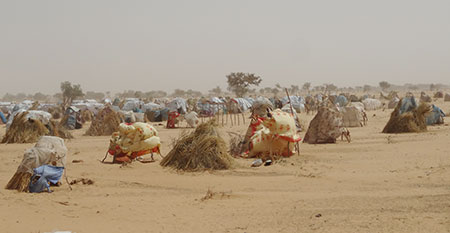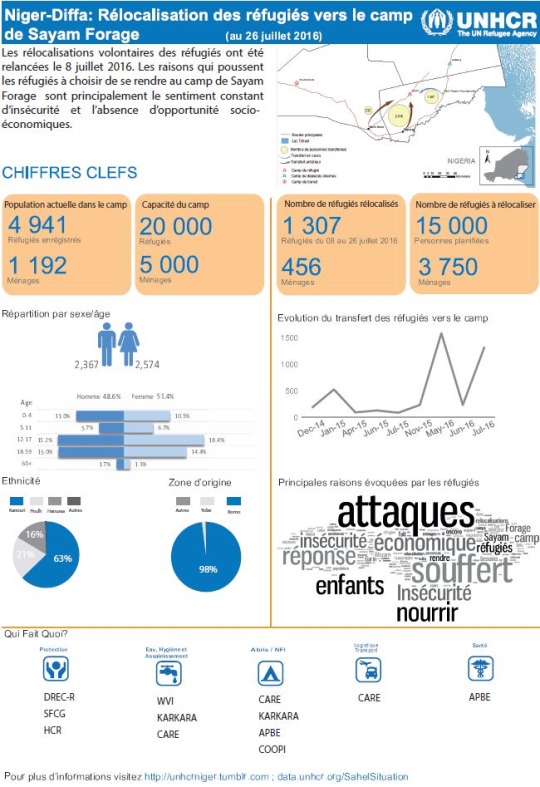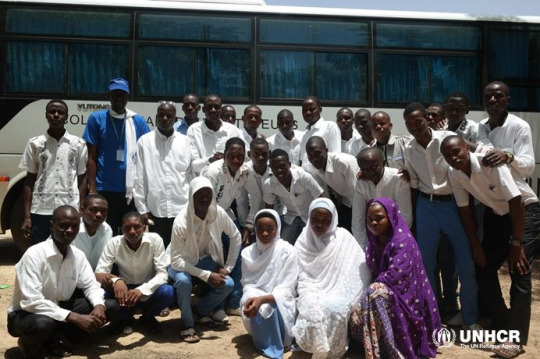UNHCR Niger
Month
 Photo: Le Sahel
Photo: Le SahelIl y a environ trois (3) ans que la secte Boko Haram a commencé ses attaques ciblées dans la région de Diffa. L'opinion nationale a amplement soutenu les Forces de Défense et de Sécurité (FDS) à travers plusieurs manifestions, telles que les levées de fonds, les marches, meetings et déclarations. En revanche, la détresse et la situation précaire des populations déplacées et réfugiées a moins défrayé les chroniques et encore moins suscité une quelconque levée de fond. Néanmoins, l'Etat et plusieurs partenaires techniques et financiers (PTF), s'attèlent dans la mesure du possible à fournir la sécurité et les assistances multiformes à cette population, ce, dans le respect de la dignité humaine, même si il persiste encore quelques manquements. Il faut souligner que l'Union Européenne a récement décidé de fournir une enveloppe de 9 millions d'Euros en soutien aux populations du Niger touchées par le conflit dans le bassin du lac Tchad.

Following attacks in the Diffa region at the beginning of June, the number of displaced persons in the region has never been so high. At various sites along the Route Nationale 1, UNHCR are assisting Nigerian refugees who wish to relocate to the Sayam Forage refugee camp. The relocation process began on the 8th of July, with a total of 1,307 assisted to relocate so far. The process is continuing.
For more information, and to read more about those people who are moving to the camp, please click here:
http://kora.unhcr.org/refugees-diffa-region-seek-peace-better-future-sayam-forage-refugee-camp/
http://data.unhcr.org/SahelSituation/download.php?id=2084
 Rabi Alassane toute souriante prête pour retourner au pays Photo@UNHCR/Siddo
Rabi Alassane toute souriante prête pour retourner au pays Photo@UNHCR/Siddo
Rabi, une petite fille Malien âgée de 8 ans, et sa mère sont motivées pour leur départ du Niger vers le Mali. Ainsi la mère affirma qu’elle rejoindra la famille au pays car son marie est rentre de l’exode, « c’est l’occasion pour Rabi de rejoindre son père ces amies d’enfance à l’école primaire du village ».
Le rapatriement volontaire déclenché depuis Novembre 2013 suit son cours dans les camps de réfugiés Maliens vivant au Niger et au niveau du centre urbain de Niamey. Au Guichet Unique (One-Stop-Shop pour les refugies urbain) de Niamey, les opérations de rapatriement volontaire sont effectuées par l’équipe de l’UNHCR, avec le concours des agents de la Direction Régionale de l’Etat Civil et des Réfugiés (DREC).
Avant de faciliter les retours, l’UNHCR s’assure que les enfants nés sur le territoire Nigérien obtiennent un acte de naissance et que les enfants réfugiés scolarisés au Niger reçoivent une attestation de scolarité, qui leur permettra de poursuivre leurs scolarités au Mali. Les malades chroniques reçoivent quant à eux une quantité de médicaments couvrant leurs besoins pour les trois premiers mois suivant le retour au Mali ; Tous les candidats au rapatriement reçoivent un Formulaire de Rapatriement Volontaire qui sert à la fois de document d’identité et de document de voyage. Enfin le HCR donne aux réfugiés un viatique de 35.000 FCFA par personne, préalablement au retour.
Pour les réfugiés Maliens qui vivent dans les camps les arguments pour le départ volontaire faciliter par les bureaux du terrain est lies à plusieurs facteurs. Le HCR met à la disposition des réfugiés les informations en sa possession concernant la situation sécuritaire prévalant dans leurs localités d’origine au Mali. Ces informations aident les réfugiés à prendre des décisions informées quant à l’opportunité du rapatriement.
Néanmoins avec ce rapatriement volontaire facilite, depuis Janvier 2016 l’HCR a enregistré 5,002 réfugiés Maliens nouvellement arrivés au Niger, fuyants les hostilités menées par les groupes des insurges dans le nord Mali. Le HCR considère que les conditions générales de sécurités dans le nord-Mali ne sont pas encore propices à la promotion du rapatriement des réfugiés. Ainsi le rôle prépondérant de l’organisation est de faciliter les retours spontanés de réfugiés tout en continuant à apporter la Protection et l’assistance aux réfugiés maliens vivants au Niger.

Les relocalisations volontaires des réfugiés ont été relancées le 8 juillet 2016. Le premier site concerné est celui de Garin Wazam. Signe que la relocalisation volontaire des réfugiés est devenue une priorité des autorités, le Gouverneur de la région de Diffa a fait le déplacement pour le départ des premiers convois à destination du camp de Sayam Forage, situé à 140 km de Garin Wazam.
La suspension des relocalisations faisait suite aux attaques survenues à Yébi et Bosso au début du mois de juin, imposant de concentrer les efforts sur la réponse d’urgence. Avant cette date et suite aux demandes des réfugiés en provenance de Gagamari, le processus avait été réenclenché. Les raisons qui les poussaient à choisir de se rendre à Sayam Forage étaient les mêmes que celles exprimées aujourd’hui par les réfugiés de Garin Wazam. Le sentiment constant d’insécurité vient s’y rajouter. Rabi Mahamadou est une réfugiée ayant fui Bosso : «nous partons car nous avons trop souffert, cela doit s’arrêter. Si d’aller au camp, nous offrira une meilleure sécurité et nous affranchira des persécutions des insurgés, nous sommes d’accord. Ici, pour trouver de quoi nourrir nos enfants, il nous faut nous déplacer sans cesse, faire des kilomètres encore et encore pour chercher l’aumône »
Depuis l’ouverture du camp de Sayam Forage le 30 décembre 2014, peu de ménages réfugiés faisaient le choix de s’y rendre. Nouvel éloignement, forte résilience, accueil par les ménages locaux, et une assistance qui devait couvrir les besoins de moins de monde expliquaient cela.
Cette nouvelle inclinaison à se rendre dans un camp est le résultat de la dégradation continue de la situation sécuritaire, économique et humanitaire. Le processus de relocalisation va se poursuivre au cours des prochaines semaines. En parallèle des activités de sensibilisation, d’identification et d’enregistrement des volontaires, les services de base au niveau du camp de Sayam Forage sont mis à niveau pour absorber cette population additionnelle. La capacité maximale du camp de Sayam Forage est de 20,000 personnes. Ils sont aujourd’hui plus de 4,000.
La population réfugiée dans les camps, ne devrait donc cesser de croitre au cours de l’année 2016, nécessitant de fait un accompagnement humain et financier considérable afin de respecter les standards en termes de protection et d’assistance multisectorielle. Pour autant, la majorité des déplacés, et donc des besoins, resteront en dehors des camps : nombreux sont encore les réfugiés qui ne souhaitent pas s’y rendre, les populations retournés n’y ont de fait pas accès, des villages entiers de déplacés internes sont venus s’agglutiner le long de la route nationale 1. Alors que la réponse humanitaire à Diffa souffre d’un niveau de financement largement en deca des besoins, malgré les relocalisations, le problème reste profond.

Despite the current difficult situation in the Diffa region, a group of Nigerian students were in high spirits this week. 29 Nigerian refugee Senior Secondary School students returned from a month’s stay in Kano, Nigeria, having successfully completed their Senior Secondary School exams. They are the second group of students to travel to Kano from Diffa to complete their exams this year. In May, 40 Junior Secondary School students travelled to Nigeria to complete their exams, before safely returning to Diffa. The latest group was welcomed back to Diffa by the Secretary General of the Governor of Diffa, the Humanitarian Coordination Cell, UNHCR and COOPI. These students are part of a Distance Education Programme, established by UNHCR and partner COOPI in 2014, with the aim of providing English speaking Nigerian refugees - who were forced to flee the conflict in Nigeria, with the chance to continue their education, and to complete their exams. Four centres were opened in the region in 2014, in the towns of Diffa, Kabelawa, Maine Soara and Bosso. Unfortunately the centre in Bosso was forced to close last year because of the insecurity in the area. However, the three existing centres hosted a total of 377 students for the 2015 – 2016 academic year, 69 of whom had the opportunity to travel to Nigeria to complete their official examinations this year. The Distance Education Programme is fully supported by both the Nigerien and Nigerien authorities, along with the West African Examinations Council (WAEC), all of whom undertook a mission to visit the three centres in Diffa last week (1st – 2nd of July). The mission also included representatives of the Regional Directorate of Secondary Education in Diffa, the Ministry of Secondary Education in Niger, The Federal Ministry of Secondary Education in Nigeria, UNHCR and COOPI. During the visit, the students expressed their gratitude to all involved, especially the Nigerien people for not only welcoming them to their country, but for giving them the opportunity to continue their education and to work towards a brighter future. The Student Representative, Malam Koura Chetima (pictured above) proudly assured those present that their efforts were worth it, “we assure you that we have passed the exams…We left here well prepared having received good educational support, and in a spirit of solidarity with our fellow students. We have returned confident and grateful for the opportunity that was offered to us”. Another student, Zeinab Abdoullahi Oumar reflected on the solidarity shown by their fellow Nigerian students and authorities, “we received a very warm welcome in Kano, the committee there made no distinction between us and the official students of the centre. There was a very friendly atmosphere between us and the other students”.

The joint mission was an opportunity for the Nigerien and Nigerian educational authorities to witness first-hand the impact that this project is having on the lives of the students. It was clear that all present were impressed with the project, and were moved to collectively commit to improving it even further for the coming year. All who were present made further commitments to support the project going forward. A particularly positive step was taken by the WAEC who have committed to creating an online platform for an Official Examination Centre in Diffa. This would mean that students wouldn’t have to make the journey back to Nigeria at the end of the year to take their exams. They also committed to provide the necessary additional support to make this goal a reality. Both Educational Ministries – Niger and Nigeria also made further commitments to the students. The Ministry of Secondary Education in Niger confirmed that they would assist in the delivery of identity cards for all of the students, which has been problematic for the students - as is the case for most of the displaced population in the Diffa region who lack identity cards and documentation. They also added that for the coming academic year, students would now have access to laboratory facilities in the Diffa secondary school, to prepare them for their science subjects, and a number of other measures. The Nigerian Educational authorities promised to provide books and educational manuals for the students and to organize further training for the teachers in Nigeria. They also committed to examining whether they might assist in covering the costs of the exams for the students. UNHCR will work on improving the infrastructure available for the coming academic year. A Memorandum of Understanding will be signed between UNHCR and the relevant parties to this effect in the coming weeks. The spirit of solidarity shown between the Nigerien and Nigerian authorities in relation to this project is typical of the relationship between the two countries as regards to the conflict in Northern Nigeria. Niger’s hospitality in terms of continuing to welcome refugees in the Diffa has been repeatedly commended internationally. This is also a brave act of resistance to the insurgent forces intent on destroying education systems - no matter the situation and the horror inflicted upon them, the population will continue to fight for a brighter future through education.